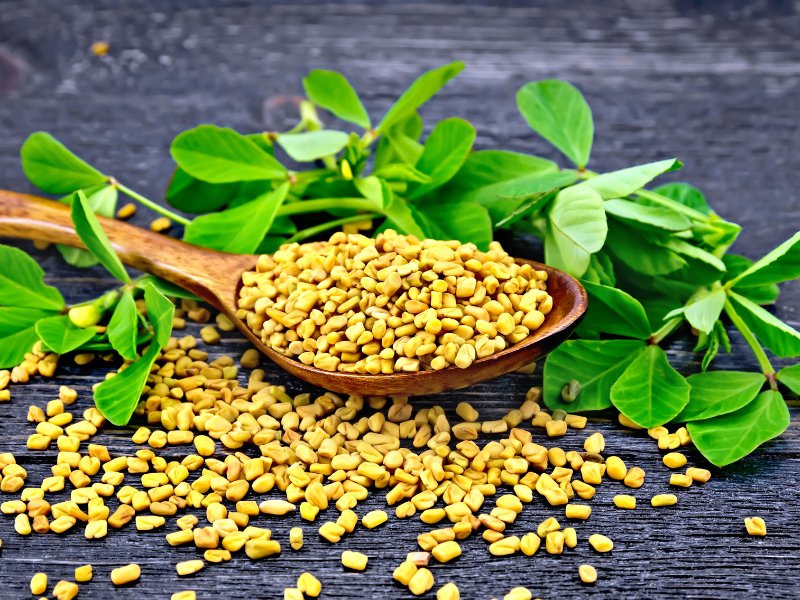
What are fenugreek seeds?
Today, there are many different types of natural ingredients that we use in everyday life, for over-the-counter medicines and much more. Among these, we find fenugreek seeds, which are some very special seeds from the fenugreek plant, which is also known by its Latin name as trigonella foenum-graecum. The plant has some very special properties in connection with, for example, inflammatory conditions in or on the body, and that is why it is also one of the ingredients in our products at QUR Medical.
QUR Herpes Gel
Buy your herpes cream here - Effective and discreet treatment of herpes 1 & 2
Buy here!
Fenugreek seeds - The origin of the plant
You may have heard of the small seeds before, but what size are fenugreek seeds? The fenugreek plant originates from Greece and is related to the pea flowers. The plant is an annual and has fine, green leaves and small white flowers that smell faintly of curry. When the plant produces seeds, it forms a long, fine shell like beans, and inside these shells are the small seeds. The shells look like beans, but are longer, thinner and more pointed at the ends and look a bit like horns, which is why they are called fenugreek. It is the small seeds, which are yellow and quite hard, that are interesting within the health and pharmaceutical industries.
Typically you will find fenugreek seeds in Southeastern Europe, North Africa and the Middle East. That is why the plant is also seen in Asian cuisine, where it is used in a wide range of different dishes. The plant not only has seeds with fantastic properties, but can also function as a wonderful spice in both dried and fresh form . Fenugreek is also grown in southern Germany, and in some years we have been able to grow them in Denmark too.
There are many ways to eat the small seeds, and they are also beneficial to the body. Typically, you will use a mortar to grind the small seeds into powder, so that they can be used in various dishes, in your morning juice or for breakfast. In addition, they can also be put in water, after which they become soft and thus edible. The widely used spice curry, which is a mixed spice, consists of a fairly large portion of crushed fenugreek seeds. In the Caucasus, where they live very long, they eat a porridge consisting of crushed fenugreek seeds just as often as we eat oatmeal at home. It is more healthy than it tastes good, and therefore we recommend that you use the seeds in other ways.
What are fenugreek seeds good for?
Fenugreek seeds contain many active substances that have a positive effect on the body in various ways. They contain trigonosides, 4-hydroxyisoleucine, galactomannan and trigonelline, among others. The active substances greatly affect the body's metabolic function, and therefore these substances have a positive effect on your blood sugar and cholesterol levels.
In addition, the small seeds also contain glycosides, a group of sugars found in almost all plants. These benefit the body by working together with the body's sex hormones and protecting against fungi and toxins.
What does fenugreek seed help with?
Fenugreek seeds are what we call an old recognized medicinal plant that has been used for millennia. It is approved by both the EMA (European Medicines Agency) and the American FDA (Federal Drug Agency) and many recognized studies show that fenugreek seeds have a good effect on a wide range of ailments. They can also help increase milk production in lactating women, where there can be an increased volume of up to 100%. Therefore, the effect can be effective for women with low milk production.
Fenugreek seeds also aid digestion due to their high levels of dietary fiber and protein. They can also act as an expectorant, which can help increase appetite if you suffer from loss of appetite. The small seeds can also be effective against heartburn if you suffer from this.
Fenugreek seeds also have a blood sugar stabilizing effect and are recognized for their anti-inflammatory effect (works against internal inflammation). Many people use a poultice of crushed boiled fenugreek seeds placed in a cloth on, for example, a shoulder or other joint with problems with good effect.
Fenugreek seeds for inflammation
What are the special properties of fenugreek seeds? There are many of them, but it is a fantastic and natural ingredient, especially for inflammation. Fenugreek seeds are used in creams, gels and other products that are intended to combat inflammatory conditions such as herpes . The small seeds can be seen as a form of natural medicine and have been used in the field for many years. At QUR Medical, we use fenugreek seeds in our products precisely to benefit from the many active substances that have anti-inflammatory effects and both prevent and treat herpes effectively, without it being a prescription product . In QUR Medical herpes Gel, fenugreek extract ensures that your herpes sore is limited in size and heals quickly.
The active ingredients in the small seeds help with inflammation by effectively treating the area and relieving pain. In the past, crushed fenugreek seeds have been used as poultices or in ointments to treat various types of skin inflammation.
Fenugreek seeds in our products
In all of our products, fenugreek seed is an important ingredient, helping to soothe the skin and relieve pain from a variety of inflammatory conditions. In addition to herpes, we also have products that can help with the red baby bump and a universal gel that can be used for, for example, burns, insect bites and itching.
By using fenugreek seeds along with other natural ingredients, you can get products that are free of chemicals and are all dermatologically tested. This way, you can take good care of your skin without having to worry about perfumes, parabens, and chemicals in your products.
QUR Herpes Gel
Buy your herpes cream here - Effective and discreet treatment of herpes 1 & 2
Buy here!

